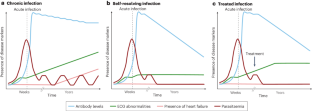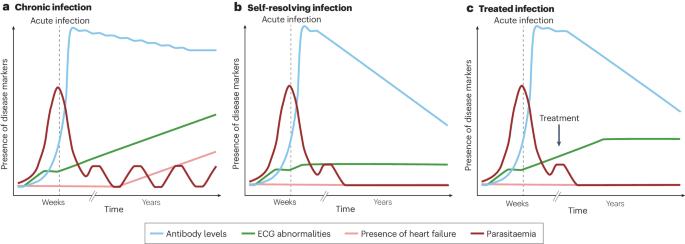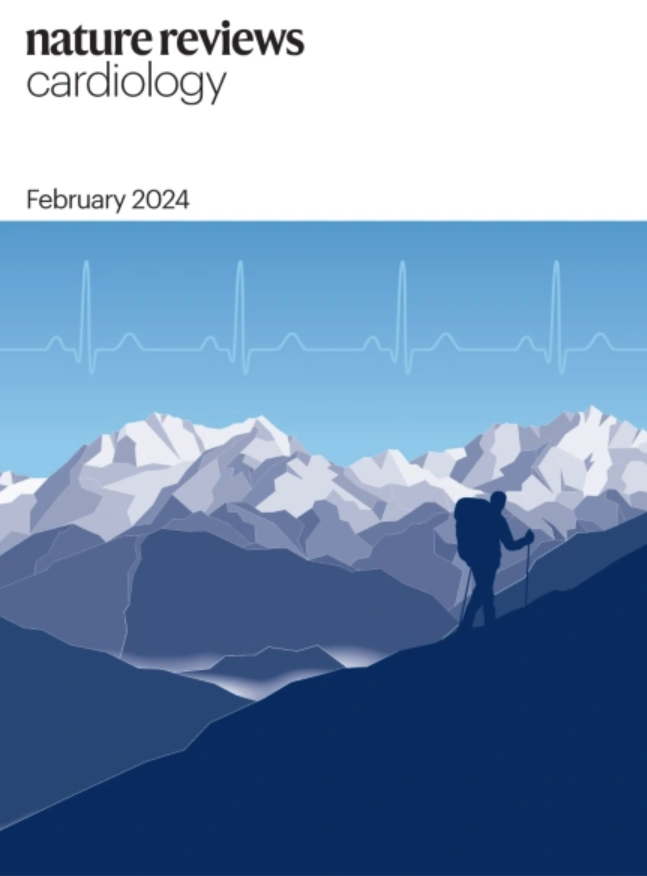Cardiac involvement in Chagas disease and African trypanosomiasis
IF 41.7
1区 医学
Q1 CARDIAC & CARDIOVASCULAR SYSTEMS
引用次数: 0
Abstract
Trypanosomiases are diseases caused by various species of protozoan parasite in the genus Trypanosoma, each presenting with distinct clinical manifestations and prognoses. Infections can affect multiple organs, with Trypanosoma cruzi predominantly affecting the heart and digestive system, leading to American trypanosomiasis or Chagas disease, and Trypanosoma brucei primarily causing a disease of the central nervous system known as human African trypanosomiasis or sleeping sickness. In this Review, we discuss the effects of these infections on the heart, with particular emphasis on Chagas disease, which continues to be a leading cause of cardiomyopathy in Latin America. The epidemiology of Chagas disease has changed substantially since 1990 owing to the emigration of over 30 million Latin American citizens, primarily to Europe and the USA. This movement of people has led to the global dissemination of individuals infected with T. cruzi. Therefore, cardiologists worldwide must familiarize themselves with Chagas disease and the severe, chronic manifestation — Chagas cardiomyopathy — because of the expanded prevalence of this disease beyond traditional endemic regions. Infection with Trypanosoma spp. can cause Chagas disease or human African trypanosomiasis. In this Review, Sabino and colleagues discuss the effects of these infections on the heart, with particular emphasis on the pathogenesis, diagnosis and treatment of Chagas cardiomyopathy.


恰加斯病和非洲锥虫病的心脏受累。
锥虫病是由锥虫属不同种类的原生动物寄生虫引起的疾病,每种寄生虫都有不同的临床表现和预后。感染可影响多个器官,其中克氏锥虫主要影响心脏和消化系统,导致美洲锥虫病或恰加斯病,而布鲁西锥虫主要引起中枢神经系统疾病,即非洲锥虫病或昏睡病。在这篇综述中,我们将讨论这些感染对心脏的影响,并特别强调恰加斯病,它仍然是拉丁美洲心肌病的主要病因。自 1990 年以来,恰加斯病的流行病学发生了重大变化,原因是 3,000 多万拉丁美洲公民移居国外,主要是移居欧洲和美国。这种人口流动导致了南美锥虫病感染者的全球传播。因此,世界各地的心脏病专家必须熟悉恰加斯病以及严重的慢性表现--恰加斯心肌病,因为这种疾病的流行范围已经超出了传统的流行地区。
本文章由计算机程序翻译,如有差异,请以英文原文为准。
求助全文
约1分钟内获得全文
求助全文
来源期刊

Nature Reviews Cardiology
医学-心血管系统
CiteScore
53.10
自引率
0.60%
发文量
143
审稿时长
6-12 weeks
期刊介绍:
Nature Reviews Cardiology aims to be the go-to source for reviews and commentaries in the scientific and clinical communities it serves. Focused on providing authoritative and accessible articles enriched with clear figures and tables, the journal strives to offer unparalleled service to authors, referees, and readers, maximizing the usefulness and impact of each publication. It covers a broad range of content types, including Research Highlights, Comments, News & Views, Reviews, Consensus Statements, and Perspectives, catering to practising cardiologists and cardiovascular research scientists. Authored by renowned clinicians, academics, and researchers, the content targets readers in the biological and medical sciences, ensuring accessibility across various disciplines. In-depth Reviews offer up-to-date information, while Consensus Statements provide evidence-based recommendations. Perspectives and News & Views present topical discussions and opinions, and the Research Highlights section filters primary research from cardiovascular and general medical journals. As part of the Nature Reviews portfolio, Nature Reviews Cardiology maintains high standards and a wide reach.
 求助内容:
求助内容: 应助结果提醒方式:
应助结果提醒方式:


